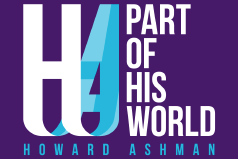The Sprinter
Howard and I were raised in a family that worried, with very good reason, about money. Debt was a given, not a theory, in our home. There are two ways to come out of that family dynamic – being a spendthrift and being a skinflint. Howard was a bit more of a spendthrift than me (actually, Ebenezer Scrooge is more of a spendthrift than me) but we both worried about money and going broke.
Which I guess is one reason why Howard might have wanted to keep on working even after he had been diagnosed with HIV in 1988.
But there were other reasons as well. Reasons that I think say much more about the man. An essay in the New York Times with the wonderful title, “Sprinting Towards the End” started me thinking about this. Dwight Garner, who wrote the piece, talks about Nora Ephron and Mike McGarry, two writers who worked until the very end.
As did Howard.
Although Howard’s work has become his legacy, I don’t think that’s what compelled him. I think that what compelled him was as simple as the need to create.
It’s something that all imaginative people feel - along with the need to run away from the compelling need to create and just sit on a beach and watch the world pass.
In Howard’s case, he needed projects. Without them he could get caught up in all sorts of minutiae, making stuff up for the pure pleasure of making stuff up. I remember a long summer where he worried – amusingly – about the state of Jane Pauley’s hair (her styles changed with the ratings). Another fallow period of writing was spent working on baking the perfect Sacher Torte, much to the pleasure of his foodie family and friends.
I have a “cast list” Howard created while working at Grosset and Dunlap Publishers where he re-imagined the people in his office as characters on the Mary Tyler Moore Show. It was pure silliness to keep the creative juices going until he got himself tied into a new project.
Re-founding the WPA (it had existed previously with different artistic directors and producers) was like an injection of wonderful for Howard. He had the reins of a theater and he took off. That’s where he created Rosewater and Little Shop, finding a composer in Alan Menken who worked to his sensibility so well.
Once he was at Disney, Howard had the confidence he needed – and all the toys a creative person could want to go full force. Animation unbound him from the real-world necessities of stage, his first love.
Then Howard got sick. And he thought it would all end – he thought that the creative options, the toys that Disney provided, the collaborations with animators and directors and his composer would disappear. Remember, at that time, many people still believed that they could catch HIV from casual contact, they were frightened and very little was being said by the government or anyone else, to dispel that fear.
Howard did not believe that he would be allowed to keep working.
That he was, that both before and after he finally announced his illness, his ideas…his creativity…were wanted and needed and welcomed, sustained him.
Which takes us back to the NYT article.
Howard complained mightily about the work he was doing, about the fuss, about the people who wouldn’t – or couldn’t - do what he wanted and the people who he perceived as getting in his way.
Howard was in a race all of his life and to the day he died – a race to create one more song, one more character, one more moment, one more piece of theater. I don’t know if Howard had a feeling he would die young – I didn’t. I thought he’d live forever until the day I found out he was dying, but I do know that well before the AIDS crisis, Howard was in a hurry to get to the next thing.
There are people who say that this sprint to the end is a form of denial and maybe that’s true for some. And, as I said in the start, they may feel a need to keep working that comes from fear of failure and poverty – for them, a fear that even outweighs the fear of death.
But I think it’s more than that. Like the people in the Times article, Howard had a visceral need to connect to others through the work he created. I think that meant not only the ultimate audience for his work but the collaborators with whom he worked.
Whether it’s painting a picture, writing a song or penning a poem no one will ever see but yourself, nothing takes a person out of himself more fully than the act of creating. So it stands to reason, doesn’t it, that when the world and your future seem dim and sometimes intolerable, going into that place of creativity is a salve and a saving grace.
It never occurred to me to suggest that Howard stop working when he got sick. I doubt it ever occurred to him either.


